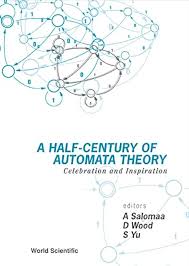“A Half-Century of Automata Theory: Celebration and Inspiration” edited by Oscar H. Ibarra, Zhe Dang, Sheng Yu, and Arto Salomaa is a notable compilation commemorating fifty years of advancements and achievements in automata theory. This volume, published in 2001, brings together contributions from leading experts in the field, offering a comprehensive overview of the past, present, and future directions of automata theory.
The book begins with a historical perspective, tracing the evolution of automata theory from its origins in the mid-20th century to its diverse applications in various areas of computer science, mathematics, and engineering today. It highlights key milestones, seminal contributions, and influential figures that have shaped the development of the field over the decades.
As the title suggests, “A Half-Century of Automata Theory” serves not only as a reflection on past achievements but also as a source of inspiration for future research directions. The contributors present state-of-the-art research topics, emerging trends, and open problems in automata theory, providing valuable insights into the challenges and opportunities that lie ahead.
The book covers a wide range of topics within automata theory, including finite automata, regular languages, context-free grammars, Turing machines, decidability, complexity theory, formal languages, and applications in areas such as software verification, natural language processing, and molecular computing.
Overall, “A Half-Century of Automata Theory: Celebration and Inspiration” is a significant contribution to the literature on automata theory, offering a rich tapestry of insights, ideas, and reflections that celebrate the past achievements and inspire future endeavors in this foundational area of computer science.
